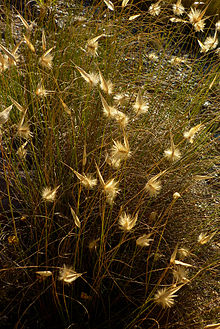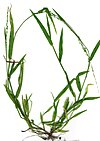Lygeum
| albardine esparto grass | |
|---|---|

| |
| Lygeum spartum | |
| Scientific classification | |
| Kingdom: | |
| (unranked): | |
| (unranked): | |
| (unranked): | |
| Order: | |
| Family: | |
| Subfamily: | |
| Tribe: | Lygeeae J. Presl (1846)
|
| Genus: | Lygeum |
| Species: | L. spartum
|
| Binomial name | |
| Lygeum spartum | |
| Synonyms[3] | |

MHNT
Lygeum is a genus of Mediterranean plants in the grass family.[4][5] It is placed in its own tribe Lygeeae, which is sister to Nardeae.[6]
The only known species is Lygeum spartum, commonly called esparto grass[3][7] or albardine.[8] It is native to southern Europe and North Africa, where its distribution includes Crete, Italy, Spain, Algeria, Egypt, Libya, Morocco, and Tunisia.[8][9] It is similar to Stipa tenacissima[10] and both species are used to produce a fiber product known as esparto or esparto grass.[11]
Description
Lygeum spartum is a rhizomatous perennial grass growing up to 75 centimeters tall.[12] The rhizome and the base of the stem are scaly.[13] The leaves are threadlike but stiff[12] and tough, measuring up to 50 centimeters long.[13] The inflorescence is made up of a few long-haired spikelets each up to 4.5 centimeters long. They are wrapped in a lance-shaped bract called a spatheole.[12] This sheath is 3 to 9 centimeters long and can have a sharp point.[13]
References
- ^ Palisot de Beauvois, Ambroise Marie François Joseph. 1812. Essai d'une Nouvelle Agrostographie 140
- ^ Tropicos, Spartum P. Beauv.
- ^ a b Kew World Checklist of Selected Plant Families
- ^ Linnaeus, Carl von. 1754. Genera Plantarum, ed. 5 27, (522).
- ^ Abdeddaim-Boughanmi, K. and M. Kaid-Harche. (2009). Structure, ultrastructure of the anther, pollen microsporogenesis and morphology of pollen grains of two populations of Lygeum spartum L. in Algeria. American Journal of Agricultural and Biological Sciences 4(3), 201-05.
- ^ Soreng, Robert J.; Peterson, Paul M.; Romschenko, Konstantin; Davidse, Gerrit; Zuloaga, Fernando O.; Judziewicz, Emmet J.; Filgueiras, Tarciso S.; Davis, Jerrold I.; Morrone, Osvaldo (2015). "A worldwide phylogenetic classification of the Poaceae (Gramineae)". Journal of Systematics and Evolution. 53 (2): 117–137. doi:10.1111/jse.12150. ISSN 1674-4918.

- ^ Altervista Flora Italiana, genere Lygeum, Sparto steppico, Esparto Grass
- ^ a b Lygeum spartum. Germplasm Resources Information Network (GRIN).
- ^ Lygeum spartum. Integrated Taxonomic Information System (ITIS).
- ^ Garcı́a-Fuentes, A., et al. (2001). Review of communities of Lygeum spartum L. in the south-eastern Iberian Peninsula (western Mediterranean). Journal of Arid Environments 48(3), 323-39.
- ^ Watson, L. and M. J. Dallwitz. 1992 onwards. Lygeum. The Grass Genera of the World. DELTA – DEscription Language for TAxonomy. Version: 18 December 2012.
- ^ a b c Clayton, W. D., et al. (2006 onwards). Lygeum. GrassBase - The Online World Grass Flora.
- ^ a b c Lygeum spartum. Flora of Pakistan.

